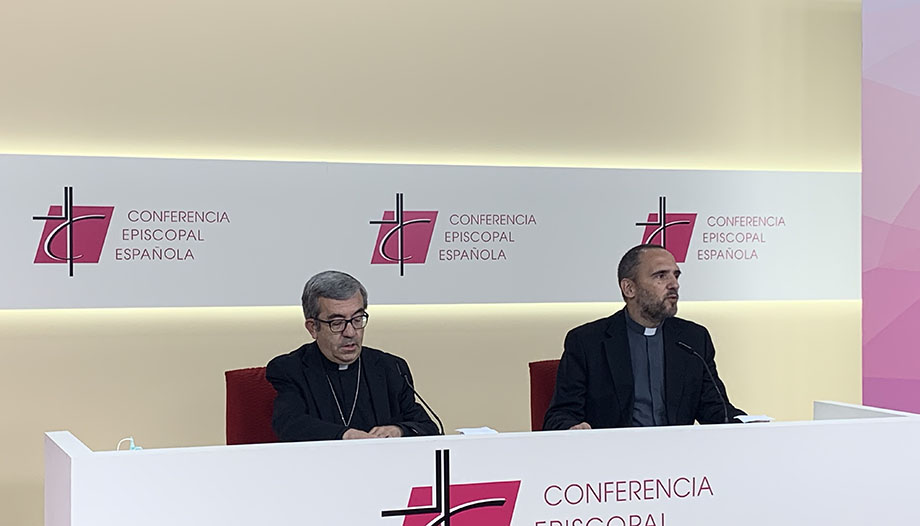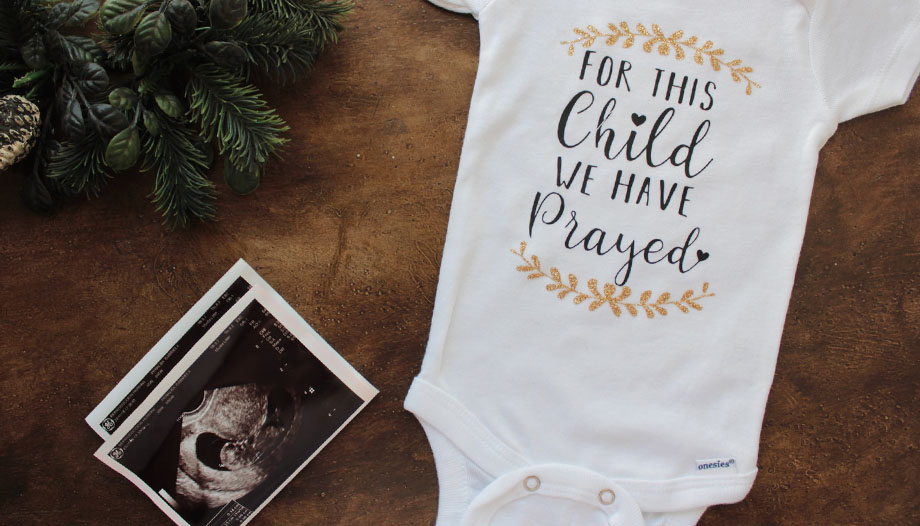Msgr. Luis Argüello responded to questions about the Church's opinion on the initiative that seeks to penalize the presence of groups of rescuers in the vicinity of clinics where abortions are performed. It was during the press conference in which the work of the Commission was reported. The Permanent Committee met in Madrid on September 28 and 29.
Argüello pointed out that "what is really worrying is that interrupting the progress of a human life is considered progress" and recalled that these groups "pray and offer alternative help to avoid the elimination of a human life". He also referred to the "significant experience of people who change their decision to abort" thanks to the help of these people and who save, in this way, a life that, as he reminded, "is not a matter of faith, but of science that tells us that there is a new human being, with its own DNA and with the capacity to develop that will come to form the life that already exists".
"How can human life not be considered a protected species?" asked the Secretary General of the Spanish bishops, who wanted to emphasize the paradox of considering it progressive to save "the wolf or the eggs of a stork" and not to protect, with the same respect, human life.
Positive steps in the prevention of abuse in the Church
Another of the topics that the spokesman of the Spanish Episcopal Conference spoke about in this press conference was the meeting held at the headquarters of the EEC with the heads of the Abuse Prevention Offices in the different dioceses. Argüello was very satisfied with the progress and the work that these offices are doing in the different Spanish dioceses.
He also recalled that the complaints are minimal, although "in some of the offices we have received news of past events. People who wanted, above all, to be heard and to insist on the need for prevention and formation in the Church" in order to avoid the repetition of similar events. He also said that some of these offices have received people "who do not have to do with abuses committed by ecclesiastics but in other areas. The Church renews its commitment to answer for its own actions, to prepare itself for the future and to offer its experience in order to offer its service to the rest of society and to be able to move forward together in the elimination of this scourge".
Argüello referred to the possible creation of a support service for the diocesan offices from the Episcopal Conference. In this sense, he stressed that the needs raised by the diocesan offices are centered, above all, on "formation, attention to victims and also in some juridical aspects". He also stressed his desire to "help coordinate the diocesan offices with the religious congregations and collaborate with foundations and associations that work in this area".
Religion in the LOMLOE
The position of the subject of Religion in the new school curriculum was another of the topics addressed by journalists after the meeting between the new Minister of Education and representatives of the Spanish Episcopal Conference.
In this sense, Argüello reaffirmed the Church's willingness to dialogue with regard to the situation, not only of the subject of Religion in the curriculum, but the anthropological conception that underlies every educational law. In this sense, he recalled that "it is very difficult to educate if one does not start from a conception of the person, of what he is and what he is called to be. Evidently in today's society there is a plurality of anthropological conceptions" and what they ask for, from the Church and many educational sectors is "the freedom of parents so that the moral and religious anthropological teaching given to their children is in accordance with their own principles".

Standing Committee Press Release
Solidarity in pain with the inhabitants of La Palma. Note
The Bishops gathered in the Standing Commission of the EEC want to express our closeness to the inhabitants of La Palma and to all the people of the Canary Islands. In a special way, we express our solidarity in pain with the many people who have lost their homes, land and work.
We also wish to urge and support all the initiatives of the local, regional and state authorities in order to rebuild all that is being destroyed by the volcanic eruption.
The Spanish Church, united more than ever to the diocese of Nivar, is already offering personal and material help through Caritas and wants to express its commitment to continue doing so in the coming months.
Many families have lost a large part of the goods that linked them to their personal and local history, live in anguished uncertainty about their future and are treading on "shaky ground" in the present. The Christian community can and wants to offer the bond of shared faith, the hope that encourages to start again and walk again and the fraternal help to support, comfort and accompany in this dramatic moment for so many Palmeros. We ask the Virgin of Las Nieves and the archangel St. Michael, patron saint of La Palma to protect and intercede for all the inhabitants of this beloved Canary Island.
Information on the synodal process
One of the topics discussed at the meeting of the Standing Committee was the implementation in the Church in Spain of the synodal process that will conclude with the next Assembly of the Synod of Bishops, whose theme is "For a Synodal Church: communion, participation and mission". This Synodal Assembly will take place in Rome in October 2023, but Pope Francis has proposed to work until that date with two previous phases: one in the dioceses and another at the continental level.
The Diocesan Phase will begin in each diocese on the weekend of October 16-17, 2021, one week after the opening of this synodal journey in Rome by the Holy Father.
The Spanish Episcopal Conference will serve this process in the dioceses with the creation of a synodal team, which held its first meeting on September 16. Archbishop Vicente Jiménez Zamora, Archbishop Emeritus of Zaragoza, has been entrusted with coordinating the work of this team, which will support the Spanish dioceses in this first phase.
Bishop Jimenez Zamora has conveyed to the Permanent Council the importance of reaching with this process to listen to all those who form the Church, in whatever place and condition they are. Likewise, he noted the drive that is taking place in the dioceses, the desire to get involved and to bring the Synod to every parish, to every community in this time foreseen by Pope Francis to give voice and listen to all the People of God.
Child Protection and Abuse Prevention Offices meeting
Luis Argüello, reported on the first meeting of the diocesan or provincial offices for the protection of minors and the prevention of abuse, which was held in Madrid on September 15. This meeting, of a technical nature, took place after the creation, in the April Plenary, of an advisory service in the EEC for these offices.
The meeting was held in a deep ecclesial atmosphere of communion, participation and mission. There was a growing need to welcome all kinds of people seeking help for abuses that have taken place in other areas.
The Standing Commission has studied the formation of a team of people in the Conference that can assist and provide the services requested by the diocesan offices.
Celebration of the World Meeting of Families, within the framework of the year of the family
Bishop Carlos Escribano reported on the development of the "Amoris Laetitia Family Year", convoked by the Dicastery for the Laity, Family and Life at the initiative of Pope Francis.
This year that the Church decides in a special way to the families opened last March 19 and will close in Rome with the World Meeting of Families (June 22-26, 2022) that will focus on the theme, "Family love: vocation and path to holiness". In view of the difficulties in reaching Rome and being able to participate in this meeting, the invitation of the Holy See has been accepted to celebrate this Meeting also in each diocese and with the possibility of organizing a national Meeting.
The EEC joins this celebration and has scheduled a week of marriage that will take place in mid-February 2022. In addition, the Episcopal Subcommission for the Family and Defense of Life publishes monthly materials to live this proposal of Pope Francis as a Family.
Escribano also presented a draft of the document "Guidelines for the Pastoral Care of the Elderly in the Present Context. After its study by the Permanent Commission, the text will be submitted to the November Plenary.
A team coordinated by the Episcopal Subcommittee for the Family and Defense of Life is working on the drafting of this document, as agreed during the April Plenary. The Episcopal Subcommission for Charitable and Social Action; the Department of Pastoral Health Care; CONFER; LARES Foundation; and the Vida Ascendente movement are also part of the team.
Start-up of the Projects and Studies Office
The Bishop of Avila, José María Gil Tamayo, has presented a project for the implementation of a Committee of Studies and Projects of the EEC. The creation of this Committee is one of the activities foreseen in the action plan of the pastoral guidelines "Faithful to Missionary Sending", recently presented, which was approved in the Plenary of April 2021.
The proposal presented, after being enriched in the dialogue of the Permanent Assembly, will be presented at the November Plenary.
Other information
The Spanish bishops will make a pilgrimage to Santiago de Compostela on November 19, the last day of the Plenary Assembly, on the occasion of the Jubilee Year of Compostela.
The members of the Permanent Secretariat were also briefed on the preparations for the visit. Ad Limina Apostolorum of the Spanish episcopate. This time it will be done in four groups, between December 2021 and January 2022, distributed by ecclesiastical provinces.
In addition, the Standing Commission has reviewed, prior to its passage to the Plenary, the modifications to the regulations of the Spanish Episcopal Conference.
In the economic chapter, the proposal for the constitution and distribution of the Interdiocesan Common Fund for the year 2022 and the budgets for the year 2022 of the Spanish Episcopal Conference and the organizations that depend on it were approved for approval by the Plenary.
The Standing Commission approved the agenda for the next Plenary Assembly to be held November 15-19. They also discussed various follow-up issues and received information on the current status of Apse (TRECE and COPE).
Appointments
The Standing Committee has made the following appointments:
- Francisco Romero Galvánpriest of the Archdiocese of Merida-Badajoz, as director of the secretariat of the Episcopal Commission for Evangelization, Catechesis and Catechumenate.
- Francisco Juan Martínez Rojaspriest of the diocese of Jaén, president of the Association of Church Archivists in Spain.
- María Dolores Megina NavarroShe is a laywoman of the diocese of Jaén, as general president of the "Hermandad Obrera de Acción Católica" (HOAC).
- Juan Antonio de la Purificación Muñoza layman of the Archdiocese of Madrid, as president of the Association "PROMOCIÓN EKUMENE" of the Ekumene Missionary Work.
- Rosario del Carmen Cases Aldeguera laywoman of the Diocese of Albacete, re-elected president of the "OBRA MISIONERA EKUMENE Association".









